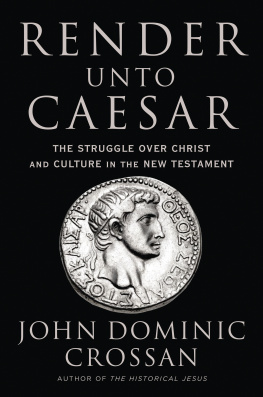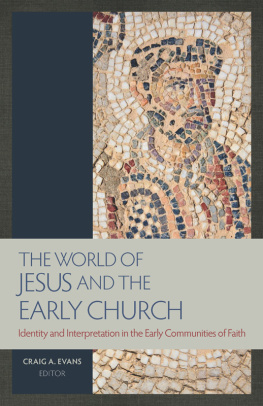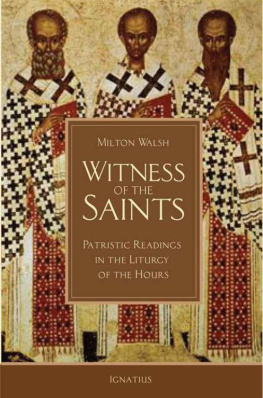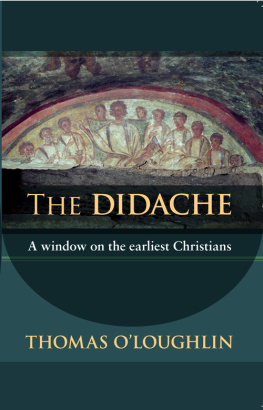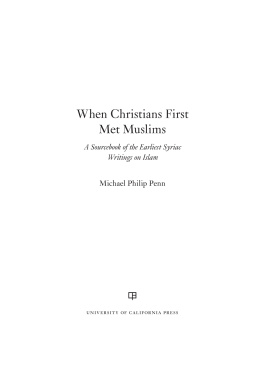Abbreviations
Acts of the Christian Martyrs
M. Agape Martyrdom of Agape, Irene, Chione, and Companions
M. Carpus Martyrdom of Carpus
M. Conon Martyrdom of Conon
M. Crispina Martyrdom of Crispina
M. Das. Martyrdom of Dasius
M. Fel. Martyrdom of Felix the Bishop
M. Fruc. Martyrdom of Fructuosus
M. Irenaeus Martyrdom of Irenaeus, Bishop of Sirmium
M. Jul. Martyrdom of Julius
M. Justin Martyrdom of Justin
M. Marc. Martyrdom of Marcellus
M. Marinus Martyrdom of Marinus
M. Max. Martyrdom of Maximilian
M. Perp. Martyrdom of Perpetua and Felicitas
M. Phileas Martyrdom of Phileas
M. Polycarp Martyrdom of Polycarp
Pass. Scil. Passio Sanctorum Scillitanorum
ANF Ante-Nicene Fathers: The Writings of the Fathers down to A.D. . vols. Edited by Alexander Roberts, James Donaldson, A. Cleveland Cox, and Allan Menzies. Buffalo: Christian Literature, 188596 . Reprint, Peabody, MA: Hendrickson, 1994 .
Aristotle
Eth. nic. Ethica nichomachea (Nichmachean Ethics)
Arnobius of Sicca
Nat. Adversus nationes libri VII (Seven Books against the Pagans)
Athenagoras
Leg. Legatio pro Christianis (Plea on behalf of the Christians)
Augustine
Civ. De civitate Dei (The City of God)
Aulus Gellius
Noct. att. Noctes atticae (Attic Nights)
Clem. Clement
CIL Corpus inscriptionum latinarum
Clement of Alexandria
Paed. Paedagogus (Christ the Educator)
Protr. Protrepticus (Exhortation to the Greeks)
Strom. Stromata (Miscellanies)
Cyprian
Demetr. Ad Demetrianum
Don. Ad Donatum (To Donatus)
Laps. De lapsis (The Lapsed)
Mort. De mortalitate (Mortality)
Pat. De bono patientiae (The Advantage of Patience)
Test. Ad Quirinium testimonia adversus Judaeos (To Quirinius: Testimonies against the Jews)
Dio Cassius
Hist. Rom. Historia Romana (Roman History)
Diogn. Epistle to Diognetus
Eusebius
Hist. eccl. Historia ecclesiastica (Ecclesiastical History)
Hippolytus
Comm. Dan. Commentarium in Danielum
Ignatius
Ign. Pol. Ignatius, To Polycarp
Ign. Rom. Ignatius, To the Romans
ILS Inscriptiones Latinae selectae
Irenaeus
Haer. Adversus haereses (Against Heresies)
Jerome
Chron. Chronicon Eusebii a Graeco Latine redditum et continuatum
Ep. Epistulae
Vir. ill. De viris illustribus
Justin
Apol. Apologia i (First Apology)
Dial. Dialogus cum Tryphone (Dialogue with Trypho)
Lactantius
Epit. Epitome divinarum institutionum (Epitome of the Divine Institutes)
Inst. Divinarum institutionum libri VII (The Divine Institutes)
Mort. De mortibus persecutorum (The Death of Persecutors)
LCL Loeb Classical Library
Minucius Felix
Oct. Octavius
Origen
Cels. Contra Celsum (Against Celsus)
Comm. Matt. Commentarium in evangelium Matthaei
Comm.
ser. Matt. Commentarium series in evangelium Matthaei
Hom. Jos. Homilies on Joshua
Mart. Exhortatio ad martyrium (Exhortation to Martyrdom)
Philo
Spec. De specialibus legibus (On the Special Laws)
Pliny the Younger
Ep. Epistulae
Seneca
Ep. Epistulae morales
Suetonius
Aug. Divus Augustus
Dom. Domitianus
Jul. Divus Julius
Tacitus
Agr. Agricola
Ann. Annales
Tatian
Or. Oratio ad Graecos (Address to the Greeks)
Tertullian
Adv. Jud. Adversus Judaeos (Against the Jews)
Apol. Apologeticus (Apology)
Bapt. De baptismo (Baptism)
Carn. Chr. De carne Christi (The Flesh of Christ)
Cor. De corona militis (The Crown)
Fug. De fuga in persecutione (Flight in Persecution)
Idol. De idolatria (Idolatry)
Marc. Adversus Marcionem (Against Marcion)
Pall. De pallio (The Pallium)
Pat. De patientia (Patience)
Praescr. De praescriptione haerticorum (Prescription against Heretics)
Prax. Adversus Praxean (Against Praxeas)
Res. De resurrectione carnis (The Resurrection of the Flesh)
Scap. Ad Scapulam (To Scapula)
Spect. De spectaculis (The Shows)
one
A Witness to the Nations: The Power of Narratives
Christianity is not one of the great things of history; it is history which is one of the great things of Christianity.
Henri de Lubac, Paradoxes of Faith
Good history is irreducibly a moral affair.
Rowan Williams, Why Study the Past?
Why This Book?
History is the stories we tell of our common past. Through stories we make sense of the world and gain a better understanding of who we are. As such, narratives are character formative: they help us define ourselves. The hearing and telling of stories, therefore, is itself a way of answering questions about what were really talking about.
The idea behind this book is to focus on the attitudes of the earliest Christians on war and military service and tell the story of the struggle of the earliest Church, the communities of Christ at the margins of power and society, to bear witness to the nations that enveloped them as they transformed the dominant narratives of citizenship and loyalty, freedom, power, and control.
Even though this book examines the available patristic writings on war and military service in the first three centuries of the Christian Church in an organized manner, the ways earliest Christians thought of themselves and the state are not presented here through the lens of antiquarian curiosity. Following Rowan Williamss advice, my aim is to see if we can recognize in their worries concerns that are still worth worrying about. For I am convinced that if we do find such recognition, we shall have found something of a common identity. Together with the reader, then, I want to think our way into the world into which Christianity arose and ask questions of the past that may help us understand the genotype of the Christian faith with the hope that such an enterprise will also help us evaluate its expression in our own time.
We must expect to be surprised by the past; but we must also expect to be questioned by it, for it is our past. As Christians we claim that because of Jesus Christ, the familiar world has been broken apart and made new. We claim to stand in historical continuity with the work of God through time and space; we claim that the reality of the earliest Christians is both different from us and part of us. Rowan Williams insists that, good history is irreducibly a moral affair... At the very least in persuading us to put some distance between ourselves and ourselves, between our imagination and what we habitually take for granted. Williams concludes:
For the Christian involved in church history, the sense of recognition, of anxieties in common, becomes a reinforcement of belief in the Church itself as a society whose roots are in something more than historical process as usually understood... As Christian students,... we shall always be haunted by [the question]: to what call is all this a responsefaithful, unfaithful, uncomprehending, transfiguring? Can we acknowledge it as our call too? And more to the point, can we see that our immersion in the ways in which they responded becomes part of the way we actually hear the call ourselves in more and more diverse and more and more complete ways.
My goal, therefore, is as much theological as it is historical. I aim to read the history of the earliest Church in a way that is theologically sensitive while still doing good history at the same time: for good theology does not come from bad history.
So, how do we do good history? How are we to engage the arguments, lives, passions, questions, practices, and witness of people who are so different than us? In answering these questions we are bound to make judgments. David Bentley Hart tells us how not to do it. Hart begins his essay, The Mirror of the Infinite: Gregory of Nyssa on the Vestigia Trinitatis , by reminding us that for the most part, in our weaker moments, [we] prefer synopsis to precision [and] find in it a convenient implement for arranging our accounts of... history into simple taxonomies, under tidily discrete divisions. That is not history at its best.


